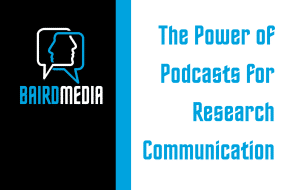
Masterclass Competition
Baird Media Announces an Exciting Competition Open to Members of the South African Podcasters Guild (SAPG).


This shift has not only changed the way stories are told but has also influenced who tells them and how they are consumed by audiences worldwide.
Traditionally, audio storytelling was dominated by public radio, where carefully crafted documentaries and features were the norm.
These productions often required significant resources, including extensive research, multiple production stages, and a team of professionals to bring them to life.
However, the advent of podcasting has democratized this space, allowing independent creators to produce and distribute their content with relative ease.
According to Siobhán McHugh’s analysis in her article, “How Podcasting is Changing the Audio Storytelling Genre,” the post-2014 resurgence of podcasting has led to the emergence of a more informal and intimate style of audio narrative.
This shift is characterized by a strong relationship between the host and the listener, with content that is often “talkier” and less heavily crafted than traditional radio features.
Podcasting has birthed a new genre that blends the traditional elements of radio documentaries with the flexibility and creativity that the podcasting medium allows.
This genre is less about following established rules and more about experimenting with new forms of storytelling.
McHugh points out that this new style is particularly evident in the U.S. podcasting scene, where narrative podcasts have flourished, often funded through a mix of sponsorship, listener donations, and crowdfunding.
One of the most significant changes podcasting has introduced is the shift in the relationship between the producer and the listener.
Unlike traditional radio, where listeners passively consume content, podcasting is an “opt-in” medium.
Listeners actively choose what to listen to, which has encouraged producers to experiment with more personal and direct forms of storytelling.
Podcasting’s influence extends beyond the United States.
McHugh’s study highlights how this new form of storytelling is impacting producers in Europe and Australia, though there are cultural and structural differences that influence how podcasting is adopted in these regions.
For instance, European audio features, known for their highly crafted and artistic style, face challenges in adapting to the more conversational and informal tone that has become popular in U.S. podcasts.
Despite these differences, the global podcasting community is rapidly growing, with producers worldwide embracing the medium’s potential to reach niche audiences.
This is particularly relevant in regions with strong public broadcasting traditions, where podcasting offers an alternative platform for creative expression that might not fit within the conventional broadcast framework.
As podcasting continues to evolve, its impact on the audio storytelling genre is likely to grow.
The flexibility of the medium allows for a wide range of content, from highly produced narrative series to more spontaneous, conversational shows.
This diversity is one of podcasting’s greatest strengths, offering something for every listener, whether they seek entertainment, education, or simply a companion for their daily commute.
For creators like Baird Media, which is set to release South Africa’s first feature-length audio drama “STRIPPED” on September 24, 2024, podcasting represents an exciting frontier.
As podcasting continues to redefine what is possible in audio storytelling, there is no doubt that it will inspire a new generation of storytellers and listeners alike.
Podcasting has irrevocably changed the audio storytelling landscape, offering a platform for experimentation and innovation that challenges traditional norms.
As the genre continues to develop, it will be fascinating to see how creators around the world leverage this medium to tell stories that resonate with diverse audiences.
STRIPPED will be released on 24 September 2024 on the website StartLivingMy.Life and wherever podcasts are available.
This blog article draws on insights from Siobhán McHugh’s research, “How Podcasting is Changing the Audio Storytelling Genre,” which explores the significant impact of podcasting on non-fictional audio storytelling formats.
When you are ready to start your own podcast, join the Baird Media Podmaster program, and let Ethan and Hendrik give you all the help and support to start your own podcast.
You can also read Hendrik’s book, “Become a Podmaster: Everything You Need to Know to Master the Art of Podcasting” to help you understand what you are letting yourself in for.
Baird Media’s “Become A Podmaster” podcast offers valuable insights, tips, and inspiration from experienced podcasters.
Whether you’re a hobbyist seeking artistic expression or an entrepreneur looking to amplify your business, this podcast has something for you.
Join the adventure and unlock the secrets of podcasting success!

Baird Media Announces an Exciting Competition Open to Members of the South African Podcasters Guild (SAPG).

This article explores the untapped potential of podcast advertising in South Africa, highlighting its ability to build trust, engage niche audiences, and drive measurable results, while making the case for brands to embrace this growing medium.

Podfade—the all-too-common phenomenon where podcasts fade away after just a few episodes—affects nearly a third of new shows. With proper planning, training, and support, creators can beat the odds. Baird Media’s Podmaster Startup Program equips podcasters with the skills and resources to sustain their passion and build a successful, long-term podcast.

This article argues that podcasts are fundamentally an audio-first medium, celebrating the power and accessibility of sound while challenging the growing misconception that they must include video.

In the rapidly evolving field of healthcare, continuous learning and professional development are crucial.
Podcasts have emerged as a valuable tool for healthcare professionals to stay informed, improve their knowledge and skills, and enhance their practice.

Podcasts have emerged as a powerful tool for research communication, offering academics and research organizations a unique platform to engage with diverse audiences.

